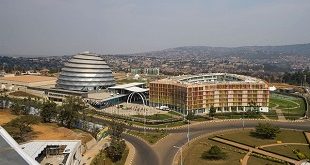
By Enock Nyorekwa Twinoburyo
Increased Chinalisation of Uganda is expensive and could boomerang
Economic ties between China and Africa have grown steadily as reflected in the increasing aid to Africa in recent years. The latest official disclosure of China’s aid indicated that it had provided over US$7 billion to Africa; however, most official aid is considered a state secret. Trade between Africa and China as of 2012 stood at US$200 billion from US$9 billion just 10 years ago.
China and Uganda diplomatic relations date as far back as to when Uganda attained its independence in 1962 and according data released by the American research group; AidData, in the decade between 2000 and 2011 China’s aid to Uganda was an enormous US$4.67 billion, slightly more than Uganda’s budget for this financial year.
The aid china provides is mainly in the form of technical assistance, with an emphasis on training in Chinese institutions; grants; interest-free loans; preferential loans that have an interest subsidy; and debt relief. In 2007, a debt cancellation protocol for all debts before 2005 was signed by the two heads of state, which amounted to US$30 million.

The sectors which have greatly benefited are transport, business related services, manufacturing, health, minerals and agriculture.
Some of the notable Chinese projects include the Kibimba (now Tilda) and Doho rice schemes, construction of the Wakawaka Fish landing site now in use and other construction projects, such as government buildings (the Ministry of Foreign Affairs, the US$36.3 million President’s Office, Naguru Hospital and the Mandela National Stadium at Nambole.
In return, China continues to benefit by being awarded big infrastructural projects including the 600MW Karuma Hydropower Damand the 51.4km Kampala- Entebbe Express High way.
President Yoweri Museveni, in his speech at the ground breaking ceremony for Karuma dam, intimated that two other Chinese companies, Gezhouba and CWE (China International Water and Electric Corporation) will similarly take on Ayago and Isimba, according to the understanding Uganda reached with the Chinese side.
The Chinese national oil company, CNOOC, is one of the three firms involved in oil exploration in Uganda. According to the Chinese Enterprise Chamber of Commerce in Uganda, the Chinese investments in the country were worth US$596 million as of February 2013 creating employment opportunities for more than 30,000 Ugandans.
The Chinese are planning to construct a multi-million dollar school that would teach Chinese to local students, in order to broaden trade and cultural ties between the two countries.
China and Uganda trade relations date as far back in the 1960s. China is one of Uganda’s main trading partners. In 2012, the trade volume between the two countries came to US$575.5 million, among which China’s export was US$546.01 million, and import US$29.49 million. This implies Uganda exports 5% of what it imports from China.
China’s strategy is to phase in zero-tariff treatment to 95 percent of the products from the least developed African countries having diplomatic relations with it, starting with 60 percent of the products in 2010.
Museveni has said that Chinese lending is also completely free of the usual meddling and high-handedness of some of the friends from outside. However it is also important to note that despite the huge funds sunk in the Uganda sectors and written off debts by china, there still are concerns over the huge trade imbalances between Uganda and China.
Uganda exports 5% volume of what it imports from China.
Most of Chinese aid is tied – with at times necessitating Uganda to import from China or least for Chinese funded project loans, it requires that the contractor is Chinese.
Most of china’s aid is also project mode, whose sustainability depends heavily on continuous support from the Chinese government. Aid flows from China are not laid out transparently to other donors and development partners, including those that are locally present.
The Chinese infrastructure projects in Uganda attract higher unit costs than similar projects in other countries. The Renaissance dam on the River Nile, which Addis Ababa projects will cost US$4.7 billion, will produce 6,000 Megawatts of power(10 times Karuma dam) when fully developed while karuma is projected to cost US$2.2billion.
Also the cost per kilometre of the US$476 million four-lane Kampala- Entebbe expressway is US$1.5 million, while a kilometre of the six lane US$612 million Addis Ababa toll motorway will cost US$1.3 million.
Based on all factors; including purchasing power parity constant, Uganda will be paying higher than Ethiopia on both projects.
There are allegedly also elements of rent-seeking activities between Ugandan and Chinese officials. The Karuma Hydro Power Dam procurement process was dogged by allegations of impropriety and whistleblowers’ complaints that culminated in court petitions and the Inspectorate Government (IGG) halting the process citing bribery and corruption in the process.
A court injunction halted the process ordering the government to repeat the technical evaluation which led to award of the to a China’s Sinohydro Corporation. The procurement flaws delayed the project for two and half years.
Although the Chinese have made significant investments in Uganda and continue to make inroads in major infrastructure projects involving roads, railway, electrical power, and communications, Uganda has not benefited greatly from increased trade with China.
The Project loans are expensive, tied double-sworded relationships. These Chinese engagements could boomerang. The hypothetical question on who the beneficiary from the increased Chinalisation of Uganda needs closer assessment.
The Chinese have historically been xenophobic. How does China stand to gain from this collaboration? Is it through market creation, global leadership, or imperialist rivalry? Remember, many Chinese in rural China still live under conditions harsher than in Uganda.
Enock Nyorekwa Twinoburyo is an economist
 The Independent Uganda: You get the Truth we Pay the Price
The Independent Uganda: You get the Truth we Pay the Price



